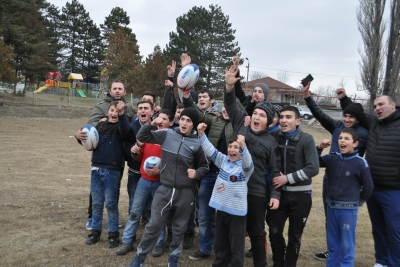The Social Power of Rugby
Date:
Planting Hope Like Rugby Balls From One Village to Another.

The boys from Plavi; Photo: UN Women
Three weeks later, the Russian national team arrives for a game. Georgia wins 28-14. The night is also a victory for gender equality. The Lelos dedicate the game to the UN Women’s HeForShe campaign in an expression of their support for the men’s solidarity movement for gender equality and for raising awareness of gender-based violence.
Rugby is why these men are such heroes to the boys in villages like Plavi. This is why at the end of February, former national rugby players and UN Women partners Nodar Andguladze, Lexo Gugava and Levan Jobava traveled to Plavi, Adzvi and Nikozi, three villages just north of Gori.
They visit on behalf of the United Nations Entity for Gender Equality and the Empowerment of Women (UN Women) and the Georgian Rugby Union. Each holding a rugby ball, Nodar, Lexo, and Levan enter a classroom filled with children mostly from ages 10-14.
They ask the children about rugby. As each child answers, they toss him or her the rugby ball. The replies vary, but the three players always lead the conversation and the ball back to a central theme of courage, discipline and respect.
“In rugby there is a position for everyone, whatever your size, your shape, or your gender,” Nono says tossing the ball to one of the girls.
Lexo breaks in with a serious tone, “You have to treat other players as you want to be treated. This is true whether you are on the field or at home.” He pauses looking around at some of the young men, “The same applies to how you treat women.”
And like that, they have moved the conversation to domestic violence almost without the children noticing. And most are eager to talk about it.
“Not all of them are eager to discuss this,” Nono says later. “That is the hardest part. If you do this long enough, then you can see it on their faces - the ones who are abused or witnessing abuse. It kills you. We tell them about the hotline and how if you witness abuse and stay silent, then you become part of the problem. We plant the ideas, but there isn’t much else we can do.”
At this point Levan Jobava leads the children outside to play rugby. He explains the necessity of training and hard work. They experience the thrill of rugby. They learn what it is like to enjoy the pain of being tackled and how empowering that good kind of pains is.
At the end, the players hand out a few balls and tee shirts. But they know that if they have been truly successful, then it is awareness, maybe even some values and self-esteem that the kids will really take home.
By Will Cathcart